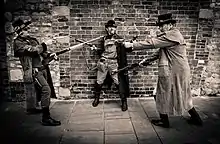Mexican standoff
English

Etymology
1876 US.[1] Purpose of Mexican unclear: may be general derogatory term for neighboring country, as in Mexican breakfast, and similar use of Dutch in British English;[2] compare rare Dutch standoff, of same meaning.[3] May be more specifically implying cowardly, or unproductive, or perhaps a reference to an event during the Mexican–American War (1846–1847).[4]
Three-way gun standoffs, popularized in spaghetti westerns such as The Good, The Bad and The Ugly (1966), have come to be called Mexican standoffs, though this usage appears to date to the 1990s, notably in reference to Reservoir Dogs (1992); earlier usage refers to this as a “three-way standoff” or “triangular standoff”.
Pronunciation
Audio (AU) (file)
Noun
Mexican standoff (plural Mexican standoffs)
- (slang) A stalemate, or a confrontation among two or more sides that no side can win.
- 1876 March 19, F. Harvey Smith, “Mexican Stand-Off”, in Sunday Mercury, New York, page 2/col. 5:
- “Go-!” said he sternly then. “We will call it a stand-off, a Mexican stand-off, you lose your money, but you save your life!”[1]
- 1891 September, N.Y. Sporting Times, volume 19, page 4/col. 3:
- ‘Monk’ Cline, who got a Mexican stand-off from Dave Rowe has signed with Louisville.[5]
- (slang) An inconclusive standoff, ending in mutual retreat.[6]
- (slang) A confrontation among two or more armed parties, none of which wants to attack first (fearing that the other could retaliate), but neither of which will disarm (for fear the other will attack).
- (slang) A three-way or more standoff.
- 1999, Foster Hirsch, Detours and Lost Highways: A Map of Neo-noir, page 259:
- [About Reservoir Dogs] In this scene, and in the three-way shootout, a Mexican standoff, the extreme, almost operatic violence is grazed with black comedy
-
- (slang, poker) A pot that is split among the players because of a tie.
-
- (rail transport) A near-collision between two trains; an averted cornfield meet.
Usage notes
Usage varies significantly over time and between users. In some use, not distinguished from a generic standoff. In other use, specifically between two parties, or specifically between three parties; specifically ending inconclusively, or ending violently.
See also
References
- Sam Clements (2013-07-26 2013), “antedating "Mexican standoff" (OED/HDAS 1891)”, in ads-l, Usenet, retrieved 2016-02-03
- Morris Dictionary of Word and Phrase Origins, by William and Mary Morris (HarperCollins, New York, 1977): Mexican Standoff “… derogatory epithets aimed at neighboring countries … classic case of such coinage of racially derogatory epithets was the rash of expressions coined by the English to put down their Dutch rivals during the eighteenth century … Something of the same attitude may be found in parts of the United States bordering Mexico. The expression ‘Mexican athlete’ is used to describe an athlete who goes out for the team but doesn’t make it. A ‘Mexican promotion’ is one in which an employee gets a fancy new title – but no increase in pay. And a ‘Mexican breakfast’ consists of a cigarette and a glass of water. So a ‘Mexican standoff’ is a situation from which nothing at all can be expected.”
- The New Records, Volumes 48-49, H. Royer Smith Company, 1980, p. 22
- Mexican standoff, The Word Detective, March 3rd, 2011
- “Mexican standoff” in The Oxford English Dictionary, 2nd edition, Oxford: Clarendon Press, 1989, →ISBN.
- Cassell’s Dictionary of Slang